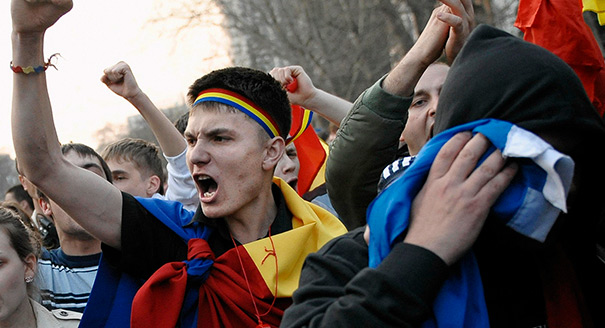The pace of change in the global economy suggests that the IMF and World Bank could be ambitious as they review their debt sustainability framework.
C. Randall Henning
{
"authors": [
"Andrey Devyatkov"
],
"type": "commentary",
"centerAffiliationAll": "",
"centers": [
"Carnegie Endowment for International Peace",
"Carnegie Russia Eurasia Center"
],
"collections": [],
"englishNewsletterAll": "",
"nonEnglishNewsletterAll": "",
"primaryCenter": "Carnegie Russia Eurasia Center",
"programAffiliation": "",
"programs": [],
"projects": [
"Eurasia in Transition"
],
"regions": [],
"topics": [
"Economy"
]
}
Source: Getty
The decision to annul the opposition’s victory in Chi?inau’s mayoral election is among the most confrontational taken by Moldova’s self-avowedly pro-European authorities. But the convergence of internal and external factors that the anti-government protests need to succeed has not yet occurred. The defeat of anti-government forces shortly before decisive parliamentary elections will leave Moldovan society even more apathetic.
In the past few months, authoritarian tendencies, the dominance of oligarchs, and state ineffectiveness have elicited protests in several former Soviet countries. In Armenia, a “velvet revolution” unseated the ruling Republican Party and its leader, outgoing President Serzh Sargsyan, who had sought to serve yet another term, this time as prime minister. In Georgia, against the backdrop of general socio-economic stagnation, mass protests occur regularly as a result of the arbitrariness of law enforcement. A spark of anti-systemic protest was even seen in Ukraine, but the country’s ruling elite managed to deport its chief instigator (and former Georgian President) Mikheil Saakashvili. Now it is Moldova’s turn, where new pro-European parties from the opposition have taken to the streets in protest against the old pro-European parties in power.
What triggered Moldova’s protests was the courts’ annulment of the results of Chișinău’s mayoral election. Andrei Năstase, one of the leaders of Moldova’s pro-European right-wing opposition, won the run-off, but his victory was ruled invalid on the grounds that Năstase had campaigned on election day. The ruling was greeted with a lack of comprehension both by Moldova’s pro-European voters as well as the European Union, for which Moldova has long since turned from an Eastern Partnership success story into a major headache. Although Moldova’s current government positions itself as pro-European, Brussels cannot ignore the direct violation of democratic norms in a country with which it signed an Association Agreement just a few years ago.
Năstase also comes from the pro-European camp, except that he represents its opposition wing. In recent years, he has become one of the fiercest critics of the ruling Democratic Party and its leader, oligarch Vlad Plahotniuc. As many observers in Moldova point out, Năstase remains linked to Victor and Viorel Topa, Moldovan businessmen who once clashed with Plahotniuc and now live in Germany. Năstase says he maintains good personal relations with the two men, for whom he once worked as a lawyer.
Unlike fellow pro-European opposition leader Maia Sandu, Năstase neatly fits the mold of street revolutionary. He was among those who led the protests of 2015-16, when Moldovans objected to the rising price of electricity, the scandal surrounding the theft of a million euros from the country’s banking system, and Plahotniuc’s attempts to claim the premiership. Năstase also led demonstrations against the replacement of Moldova’s proportional voting system with a mixed one: the introduction of single-mandate districts should help the Democratic Party to retain a majority in this fall’s parliamentary elections.
In light of this activity, the Moldovan authorities have decided that Năstase cannot be allowed to occupy the mayor’s office, which would provide him with a convenient platform for fighting the current government. For example, Năstase would be able to release documents compromising the Liberal Party, which governed Chișinău, and its one-time political ally, the Democratic Party.
Similarly, Năstase’s rise could destabilize political life in Moldova, where the pro-European opposition appeared until recently to be weak and divided. Such a shift could seriously affect the results of the upcoming parliamentary elections, which have to take place by the end of the year and are certain to be momentous for the current regime.
Finally, for the Moldovan authorities, it is crucial that they control the mayor’s office of the capital, which will elect 11 single-mandate parliamentarians — of a total of 101 lawmakers — in the upcoming elections.
Could the ongoing protests bring about regime change in Moldova? Although pressure will continue to grow as the parliamentary elections approach, it is too early to write off Plahotniuc and his party.
For the anti-government protests to succeed, a considerable number of internal and external factors must converge. First, a critical mass must emerge within society of people willing to overcome political apathy and unite around informal social ties and mutual expectations. Yet in Moldova, society is deeply divided on questions of identity and geopolitics: some favor integration with Russia, others look to the EU, some seek unification with Romania, others oppose it. When Năstase protested alongside pro-Russian politicians Igor Dodon and Renato Usatîi in 2015 and 2016, his popularity among pro-European voters immediately plummeted. Today Dodon, who is now president, cannot support the protests on principle, having been accused by Năstase of conspiring with Plahotniuc.
Moldova’s socio-economic situation also plays a role in perpetuating political apathy. Large-scale poverty and significant emigration are eroding much of Moldova’s highly skilled population, leaving behind those who have come to terms with the country’s realities and will only take to the streets over severe economic problems, such as a drastic electricity price hike. Moldova’s current government understands this, and navigates social issues with caution. It even managed to achieve moderate economic growth after the crisis of 2014-15.
One significant external factor is the role played by the U.S. and EU member states, which actively participate in Moldova’s domestic politics and sponsor its pro-European element. On the one hand, the West would like to see Moldova fully democratized and Europeanized, so the Moldovan authorities’ bogus reforms and political manipulations have left the West wanting to scale back its financial support for the country’s budget. The European Commission has expressed its concern with the invalidation of election results and put on hold a new tranche of 100 million euros in macro-economic assistance to Moldova.
On the other hand, the Democratic Party is a reliable geopolitical partner for the West. It provides political stability in Moldova and prevents pro-Russian forces from rising to power, a leitmotif that the Moldovan authorities emphasize in their dealings with the West. In the past year, they have embarked upon a number of effective PR stunts along these lines, declaring Russia’s then-deputy prime minister Dmitry Rogozin persona non grata, adopting a law on countering “Russian propaganda” that is questionable from the point of view of European norms, and introducing a UN General Assembly resolution on the withdrawal of Russian troops from Moldova’s breakaway state Transnistria.
The decision to annul the results of the capital’s mayoral election is confrontational, but it is far from clear that it will radically change these external factors. The U.S. has been very restrained in its statements on the matter, and the ruling party of neighboring Romania — which is itself in conflict with Brussels over the observance of democratic norms — is unlikely to end its close cooperation with the Moldovan authorities.
In the absence of a unified opposition, external support, and economic incentives, Moldova’s protests are unlikely to succeed, and their failure could fatally impact the results of the parliamentary elections at the end of this year. If people come to believe that they are powerless, the protest electorate will show up at the polls in meager numbers, which will help the current regime hold on to power.
Carnegie does not take institutional positions on public policy issues; the views represented herein are those of the author(s) and do not necessarily reflect the views of Carnegie, its staff, or its trustees.
The pace of change in the global economy suggests that the IMF and World Bank could be ambitious as they review their debt sustainability framework.
C. Randall Henning
Despite considerable challenges, the CPTPP countries and the EU recognize the need for collective action.

Barbara Weisel
Integrating AI into the workplace will increase job insecurity, fundamentally reshaping labor markets. To anticipate and manage this transition, the EU must build public trust, provide training infrastructures, and establish social protections.

Amanda Coakley
The fear that Europe might ‘fall behind’ rival economic powers has long shaped European integration. In the present phase of global disorder, this fear has intensified.
Scott Lavery
The Russian army is not currently struggling to recruit new contract soldiers, though the number of people willing to go to war for money is dwindling.

Dmitry Kuznets